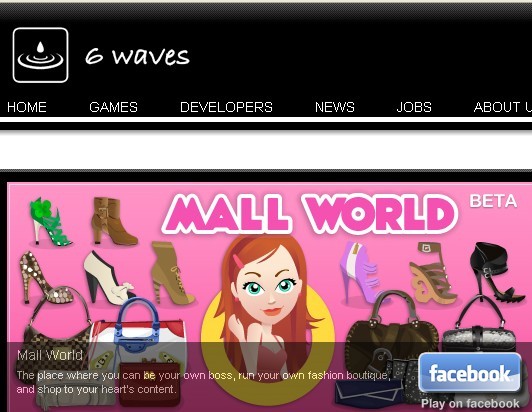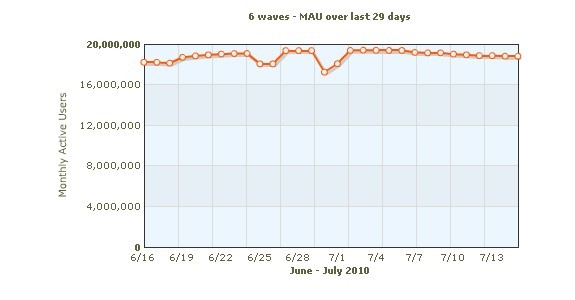人物专访:6waves创始人Rex Ng谈海外社交游戏运营策略
6waves是立足于中国香港的全球社交游戏开发者,目前在facebook游戏应用程序开发者排行榜中位居第十,每月有超过1800万的活跃用户在使用6waves的游戏程序。据统计6waves旗下有126款facebook版社交游戏,并且代理其他开发者发行了36款社交游戏。这些游戏就包括Mall World(超级市场)、开心水族馆以及卡罗米特王国。
6waves联合创始人Rex Ng在接受专访时表示,游戏海外运营不可避免会遇到语言和文化的障碍,而他们的一般做法是将这些工作外包更专业的公司,由他们来协助打造游戏的海外版。目前6waves旗下的游戏在全球已经有10个与众版本了。
在游戏虚拟支付方面,Rex Ng表示他们一般更加信赖paypal和信用卡支付,但是在不同的国家会有不一样的调整。另外在海外运营的时候会遇到一些评估上的失误,比如对一些高期待的地区事实上并没有带来好的收益回报,而有些看起来不太象样的市场却带来了不俗的收益。
Rex Ng认为全球市场上他们的目标,因此他们将尽可能多地在全球寻找合适的战略环境。
Localization, or the process of adapting a game to another culture and language, is a hot topic this year among social game developers. While the US market quickly became saturated with players in 2009, Facebook’s international audience of more than 500 million people appears to offer a vast opportunity for further expansion.
However, the process of moving a product to a foreign userbase is more complex than just translating the text. Other cultures have different expectations for the user interface and interactions, while many markets have their own peculiarities of payment processing and monetization.
Inside Social Games will be running a series of interviews over the coming weeks with some of the smartest international developers. This first interview is with with 6waves co-founder Rex Ng, who publishes over three dozen games including Mall World, 開心水族箱 and Kingdoms of Camelot.
To start off, Rex defined three areas of localization for us: language, payment and marketing, with language being the easiest and payment hardest.
Inside Social Games: Since language is the easy part, let’s start there. What’s your process?
Rex Ng: It’s a two-pronged process for us. We have a professional translation company that we outsource to, and our core product has 10 languages already. That’s the first step. Then we also have in-house country managers who review the translations and make sure the stuff is up to par, and we’ve revised specifically for games like Mall World, which is more female-oriented.
ISG: What makes payment localization difficult?
Ng: PayPal and credit cards are very prominent in the US, but for each new country we have to go in and have a localized resource for the market. A lot of times the payment choices for micro-transactions, they may not start out as a dedicated company. Some of them are game companies with a payment channel, so we’ll reach out to them. Second to that is integrating the system — it’s not like they’ll just provide a payment API. When we integrated with Gamania we were the second or third partner, so there was a lot of work making sure it was accurate, and getting payment reports on a granular basis so we could use the data to analyze how the game is doing for the country. That’s a lot of work,. There are also a lot of new companies that are trying to break into these emerging markets and create payment channels, like Turkey, Brazil and India, but a lot of these companies are newer, so we have to be the guinea pig them to test out and see how their systems are scaling.
ISG: How are the different world regions developing, in terms of prepared payment channels?
Ng: I think the premium model has sparked a lot of companies to specialize in payments. They are coming relatively quickly. In Europe there weren’t a lot of these channels, but when we last went to Hamburg there were a bunch. They’re spawning quite quickly, but it will take a couple months to see which channels will come out on top. In the newer areas, like in South Asia and Latin America, they’re coming out as well. By the end of 2010 a lot of these companies will start to stabilize, but we always want to be one of the first to find out which companies are best.
ISG: Marketing is the last of the three pillars you mentioned. How does that work?
Ng: There are times where, let’s take Taiwan for example, the Facebook traffic there was not great until we’d pushed a lot of our games and done local marketing. A lot of the PR was from the game sites, the local media. So for a lot of Asian countries, the first time they’ve heard about Facebook is from the games. At the time our farming game was the most played, and there were a lot of articles, a TV announcement, etc — it became a pretty big phenomenon, and drove a lot of users back to the game.
ISG: Are you finding anything surprising about your revenue from specific markets?
Ng: There are certainly surprises. There are countries we expect higher but are lower, and vice versa. A good example is actually Taiwan and Hong Kong, where we expected ARPU to be lower than Western Europe and North America. But at the end of the day, it turns out that Taiwan has such a strong gaming culture, their ARPU is almost on par with the games we’re seeing in North America. A lot of times it’s difficult to say whether it’s on par because the payment stuff is still developing, but for a country that has strong support, where the payments are frictionless, they become comparable. Even with lower GDP per capita.
ISG: Given the choice today would you launch a game in the US or internationally?
Ng: Almost all of our games that we sign up have a good universal appeal, so we try to invest in as many markets as possible. For the US it’s very competitive, so we’re not trying to be #1 in that space. Some games like Mall World are monetizing and doing well, but for us we’re also trying to stagger these games. So we’re trying to launch games, one or two a month, and we try to stagger the launch for different countries.
ISG: You focus heavily on Asia. Is it OK to leave a game in English for the Asian market?
Ng: A lot of the most quality games are still in English, and the games aren’t so complicated that they require a lot of explanation. So for English games, 50 to 60 percent of our traffic could be coming from international countries. If you look at FarmVille and select the international countries, you’ll see a lot of users.
ISG: Any last comments?
Ng: Facebook’s growth will come mainly from the international market, and the English-language market is a little more saturated in terms of users, the pay rates, the ARPU — those are all going to saturation point. For international, the upside is a lot more, both from a pay rate and ARPU perspective. That’s why we’re spending a lot on our effort to optimize all of these.










































 闽公网安备35020302001549号
闽公网安备35020302001549号